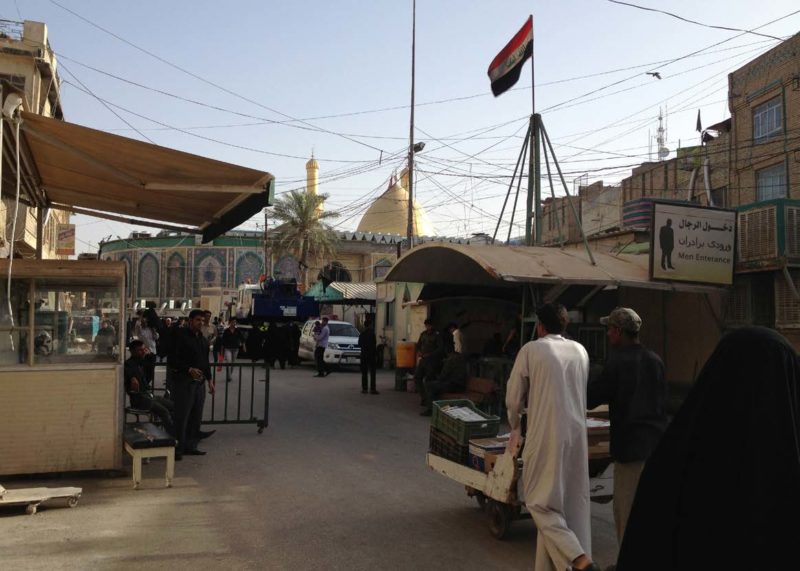My mother said:
My grandfather’s house was the place in Najaf that gathered my entire family. The house is really big, it once filled two families in there. They always had relatives coming plus friends, neighbors; all of them gathered, so much that the door was never shut. Nobody knocked on the door. They come just to say Eid Mubarak when it was Eid time. Men come in and say, “Ya Allah, Ya Allah,” to let the women know someone is coming and to warn them to put on their hijabs. But the house is open and anyone is welcome.
When we are in a country that is different, we want to show to our kids that the mom, dad, and siblings aren’t the only ones that are fasting. We go to the center to show them others that are fasting too. Kids exchange their stories, their experiences, “The day is long and I got hungry, I got thirsty. I went to school I did this and that.” This is what we give our kids; we show them that they aren’t the only ones going through this.
We need to tell others about our experiences too, what we are doing; pass on our story and help them accept us.

Family trip back to Iraq in 2013. Photograph by Farah Alkhafaf.
I never thought about moving back to Iraq until I visited in 2013. In every house I would step into, the first two questions that escaped my relative’s mouths after awkward formalities were, “How did you like Iraq?” and “After seeing Iraq, would you ever choose to live here?” Living in my comfortable lifestyle in New Orleans, I never imagined moving out of my hometown unless to go someplace luxurious like Los Angeles or London. However, after my visit, I realized that luxury is not all in the material things. To be close to the Shrines of our revered Imams and to walk the streets my grandfathers paved, this is luxury. It is luxury to embrace an open door policy and visit my family’s home without a need to call ahead. To speak your rich language and to be submerged around the people who are most resilient against all odds, against all the troubles they face, is the ultimate gratification of life.
When I went to Iraq in 2013, I witnessed large masses of people sleeping in the streets, wearing dusty clothes and walking barefoot… some people didn’t even have any limbs (results from daily exposures to bombs and warfare) and they managed to crawl to visit the Holy mosques. Deep wrinkles were drawn onto the faces of the Iraqis and pain was so sorely apparent in their eyes. But they were the happiest group I had ever met. They were the most giving. I still do not understand this paradox completely. When asking my parents about this, they said that the people I met had incredible faith. In Islam, we say Alhamdulilah, all praise be to God, in every good life occurrence and bad. We remind ourselves to thank Allah for our hardships and to treat everything in our lives as blessings. The Iraqis are truly the most blessed people I have ever encountered and I am proud to be from among them.
I have learned various lessons of strength in my life, as a first generation Shia woman from Iraq living as a minority in the southern United States. My religious upbringing taught me stories of brutality and injustice met with tolerance and faith. My family’s experiences mirrored these stories and further strengthened the principles I hold today: to uphold justice and ensure rights for every being around me, to speak for those whose voices momentarily tremble, and above all, to keep faith in God no matter how life decides to take course. Against all difficulties and no matter any situation, these are the things that will remain the foundations of my existence.
 NOLAbeings Multimedia artist Claire Bangser created NOLAbeings as a portrait-based story project that marries...
NOLAbeings Multimedia artist Claire Bangser created NOLAbeings as a portrait-based story project that marries...  Voodoo in New Orleans: Reviving history: New Orleans fortune telling This article takes a deep dive into the history of Voodoo in New Orleans, its hybridization with Catholicism, and its present-day place in the city's culture. The author visits fortune-tellers in the French Quarter, using their guidance as a tool for introspection rather than a deterministic predictor of the future. Through her experiences in New Orleans, the author feels a mystical connection to both the past and the future.
Voodoo in New Orleans: Reviving history: New Orleans fortune telling This article takes a deep dive into the history of Voodoo in New Orleans, its hybridization with Catholicism, and its present-day place in the city's culture. The author visits fortune-tellers in the French Quarter, using their guidance as a tool for introspection rather than a deterministic predictor of the future. Through her experiences in New Orleans, the author feels a mystical connection to both the past and the future. 